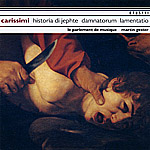Jephte was Carissimi’s masterpiece–a highly inspired oratorio on par with Monteverdi’s renowned Il Combattimento di Tancredi e Clorinda, likewise loaded with dramatic scenarios and operatic gesture. Basically, illegitimately-born outlaw leader Jephte makes a pact with God declaring that if God allows Israel to triumph over Ammon he will sacrifice the first person he sees after victory. As it turns out, the first person he sees happens to be his only daughter Filia (incidentally betrothed to Jephte’s top warrior Hamor). Depending on interpretation this saga has two endings. One is that just before Jephte is about to do the deed an angel appears and proclaims that if Filia agrees to remain a virgin and dedicates herself to God for the rest of her life, she’ll live (Handel’s choice). Carissimi opts for the more tragic, notorious conclusion where Filia begs Jephte to instead allow her and her “companions” to flee to the mountains, forever lamenting their wasted lives as virgins.
There’s certainly been no shortage of great recordings of Carissimi’s Jephte. Colleague Robert Levine lavished well-deserved praise on Jos van Veldhoven’s often boisterous, wonderfully expressive account on Channel Classics (type Q5259 in Search Reviews). Erik van Nevel’s somewhat more subdued, reverential performance (Accent) equally impresses, especially during the finale when Filia (gloriously sung by soprano Maite Arruabarrena) and companions convincingly mourn, weep, and wail to great effect. Here, Martin Gester with Le Parlement de Musique offers another excellent performance that strikes a fascinating balance between the other two. Gester’s poised yet alert instrumental momentum heightens the drama while affording the vocalists ample expressive opportunity.
Tenor Luca Dordolo is a commanding though emotionally vulnerable Jephte–most notable in his very affecting dialogue with Filia (soprano Elisa Franzetti) before he banishes her. Franzetti’s brilliant Filia is equally complex, her early jubilation instantly transformed when she learns of her impending fate. The numerous narrative and choral sequences are also vigorously and stylishly executed.
Two motets and a charming harp transcription of a toccata fragment, “Partite sopra Passacagli”, by Frescobaldi, as well as two brief though engaging sinfonias by Lelio Colista provide interludes before the final offering–Carissimi’s oratorio Felicitas Beatorum (the happiness of the blessed). Not nearly as dramatic nor interesting as Jephte, this work is simply a 15-minute recitative extolling the dangers of earthly temptation and how great all will be when we die. Opus 111’s sound and presentation are first rate. Informative and entertaining notes by Lain Fenlon and Gester as well as full texts and translations are also included.
































